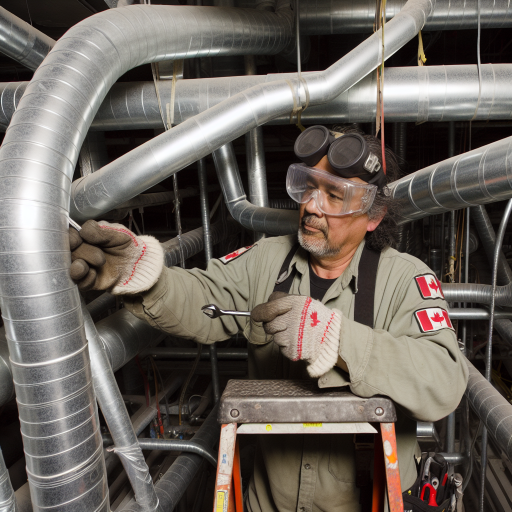Overview of the Electrician Profession in Canada
The electrician profession plays a vital role in Canada’s industrial landscape.
Electricians ensure safety and reliability in electrical systems.
They work across various sectors, including residential, commercial, and industrial.
In Canada, electricians must complete a mandatory apprenticeship program.
This program typically lasts four to five years, combining classroom and hands-on training.
Additionally, electricians must comply with local electrical codes and standards.
These standards demand a high level of skill and expertise.
Daily Responsibilities of Electricians
Electricians face multiple tasks each day, ensuring systems operate efficiently.
They install, maintain, and repair electrical wiring and equipment.
Moreover, they diagnose electrical problems and offer effective solutions.
In the field, electricians often communicate with clients about their needs.
As a result, strong interpersonal skills are essential in this profession.
Work Environment and Conditions
The work environment for electricians varies greatly.
Some electricians work indoors in residential settings.
Others might operate outdoors, often facing the elements.
Generally, the role requires physical stamina and agility.
Electricians often climb ladders and work in confined spaces.
Safety is a top priority, as they deal with high voltage systems.
Career Outlook and Opportunities
Electricians enjoy a positive job outlook in Canada.
As the demand for electrical work increases, opportunities expand.
Technological advancements also create new areas of specialization.
Renewable energy sectors, such as solar and wind power, require skilled electricians.
Additionally, electricians can pursue roles in supervision and management.
Skills and Qualifications
Becoming a successful electrician requires a mix of skills.
Technical knowledge of electrical systems is crucial.
Unlock Your Career Potential
Visualize a clear path to success with our tailored Career Consulting service. Personalized insights in just 1-3 days.
Get StartedProblem-solving abilities allow electricians to tackle complex challenges.
Furthermore, attention to detail ensures safety and compliance.
Electricians must also stay updated with evolving technologies.
Continued education and certification may enhance job prospects.
Typical Daily Schedule: A Morning in the Life of an Electrician
Early Start
The alarm blares at 6:00 AM, waking Alex from a deep sleep.
After a quick breakfast, he gathers his tools and checks his gear.
At 6:30 AM, he heads out to the first job of the day.
Morning Commute
Driving through the quiet streets, Alex enjoys the peaceful early morning.
The sun starts to rise, casting a golden glow over the city.
By 7:00 AM, he arrives at a residential site in downtown Toronto.
First Job: Wiring Installation
Alex meets the homeowner, Sarah, who briefs him on the project.
He inspects the area before starting the wiring installation.
First, he turns off the power to ensure a safe working environment.
Setting Up
Alex lays out his tools: wire cutters, pliers, and a multimeter.
Next, he measures and cuts the wire to the required lengths.
With precision, he begins connecting the wiring to the circuit panel.
Troubleshooting
As he works, a slight issue arises with the circuit connections.
He carefully checks his work to identify the problem.
After a few adjustments, the system powers up successfully.
Wrapping Up
By 10:00 AM, Alex completes the wiring installation.
He reviews his work with Sarah, ensuring everything meets her expectations.
After a peek at the new fixtures, she is delighted with the result.
On to the Next Job
With one job finished, Alex packs his tools for the next site.
He checks his schedule, noting an electrical repair in a nearby office.
At 10:30 AM, he hops back into his van, ready for the day ahead.
Common Tasks and Responsibilities
Installation of Electrical Systems
Electricians begin their day by reviewing project plans.
They consult with architects and engineers for details.
Next, they measure and cut wires to appropriate lengths.
After that, they install light fixtures and outlets.
Electricians then connect wiring to power sources.
They carefully follow safety regulations during installation.
Maintenance of Electrical Systems
Regular maintenance is crucial for electrical systems.
Electricians inspect existing wiring for signs of wear.
They often test circuits to ensure functionality.
If issues arise, electricians diagnose the problem promptly.
They then make necessary repairs to restore function.
Routine inspections prolong the lifespan of electrical systems.
Safety and Compliance
Safety is paramount in an electrician’s duties.
Electricians adhere to strict electrical codes and guidelines.
They use personal protective equipment at all times.
Throughout the day, they ensure their work area remains safe.
This includes keeping tools organized and maintained.
Customer Interaction
Electricians frequently communicate with clients.
They explain the work being done and answer questions.
Customer satisfaction is a key focus in this field.
Professionals provide estimates for upcoming projects.
They also follow up after job completion to ensure satisfaction.
Continuing Education and Training
The electrical industry is constantly evolving.
Electricians engage in ongoing training to enhance skills.
They keep up with new technologies and techniques.
Many electricians attend workshops and seminars regularly.
Certification courses help them maintain industry standards.
You Might Also Like: Why Skilled Labor Jobs in Canada Are the Backbone of Economic Recovery
Work Environment: Residential vs. Commercial vs. Industrial Settings
Residential Settings
Electricians working in residential settings focus on homes and apartments.
They install wiring, outlets, and fixtures during construction.
Moreover, they perform upgrades and repairs on existing systems.
Daily tasks involve troubleshooting electrical issues for homeowners.
The work is often hands-on and requires problem-solving skills.
Additionally, electricians must navigate various layouts and designs.
Safety is paramount as they work around family members and pets.
Commercial Settings
In commercial environments, electricians deal with businesses and offices.
They install large-scale electrical systems that support operations.
Tasks often include running conduit and installing circuit panels.
Electricians work closely with project managers and contractors.
Effective communication helps ensure project timelines are met.
Time management is crucial as businesses run on strict schedules.
Moreover, electricians must be familiar with commercial codes and regulations.
Industrial Settings
Industrial electricians focus on factories and manufacturing plants.
They work with heavy machinery and complex electrical systems.
Maintenance and troubleshooting are key components of the job.
Safety protocols are strictly enforced to protect workers.
These electricians often work in challenging environments.
As a result, they must wear protective gear regularly.
Flexibility is important, as shifts can vary based on production needs.
Comparative Summary
Each setting presents unique challenges and rewards for electricians.
Residential work offers personal interaction with clients.
In contrast, commercial settings demand teamwork and organization.
Meanwhile, industrial environments require technical expertise and safety diligence.
Ultimately, the choice of setting influences daily responsibilities.
Discover More: The Rise of Electrical Work in Canada: Opportunities and Growth
Tools of the Trade: Essential Equipment and Safety Gear
Introduction to Electrical Tools
Every electrician relies on a unique set of tools.
These tools enhance efficiency and safety on the job site.
Understanding these essentials can improve your skills significantly.
Common Hand Tools
Hand tools are indispensable for electricians in Canada.
Screwdrivers are a must for various tasks.
Pliers are needed for gripping and cutting wires.
Wire strippers help remove insulation without damaging the wire.
Additionally, a tape measure ensures precise measurements.
These tools are lightweight yet powerful for daily tasks.
Power Tools Used
Power tools save time and effort on larger projects.
Drills are commonly used for making holes in walls.
Reciprocating saws are essential for cutting through materials.
Moreover, circuit testers help check electrical systems quickly.
These tools facilitate complex installations and repairs.
Safety Gear for Electricians
Safety gear protects electricians from hazardous conditions.
Hard hats shield against falling objects on job sites.
Safety goggles prevent eye injuries from sparks and debris.
Insulated gloves protect hands from electric shocks.
High-visibility vests enhance safety in low-light conditions.
Additional Safety Equipment
Electricians should also use cushioned kneepads for comfort.
Electrical boots provide insulation against electric currents.
First aid kits are vital in case of emergencies.
Regular maintenance of safety equipment is essential for effectiveness.
Proper tools and safety gear ensure effective work.
Explore Further: Skilled Trades Careers That Are Booming in Canada Now

Challenges Faced
Weather Conditions
Electricians often face unpredictable weather in Canada.
Winter brings extreme cold and snow interruptions.
This impacts job schedules and project timelines.
Summer storms can create dangerous working conditions.
High winds and rain can hinder outdoor electrical work.
Electricians must adapt to seasonal weather changes.
Physical Demands
The job requires significant physical strength and stamina.
Electricians often lift heavy equipment and materials.
This can lead to fatigue and physical strain over time.
Working in awkward positions is a common challenge.
The nature of the job stresses the back and knees.
Regular exercise and stretching help prevent injuries.
Safety Risks
Working with electricity poses inherent safety risks.
Electricians must follow strict safety protocols daily.
Wearing proper personal protective equipment is essential.
Hazardous materials can be present on job sites.
Falling from heights is a significant concern in this field.
Training and knowledge reduce the risk of accidents.
You Might Also Like: Creating a Pollinator Garden in Canada
Career Advancement Opportunities
Certifications
Obtaining certifications is vital for electricians in Canada.
These certifications enhance both credibility and skill level.
Organizations like the Electrical Safety Authority offer valuable programs.
Many regions require specific certifications for specialized tasks.
Specializations
Electricians can choose to specialize in various fields.
Common specializations include residential, commercial, and industrial electrical work.
Some electricians focus on renewable energy technologies.
Specializing often leads to higher demand and better pay.
Continuing Education
Continuing education is crucial in the ever-evolving electrical field.
Trends in technology require electricians to stay updated.
Workshops, seminars, and online courses provide useful knowledge.
Many unions and associations offer resources for continued learning.
This commitment to education can advance an electrician’s career.
Networking Opportunities
Networking plays a critical role in career advancement.
Joining associations like the International Brotherhood of Electrical Workers can help.
Networking events allow electricians to meet industry leaders.
These connections can lead to job opportunities and collaborations.
Career Paths
Electricians can pursue diverse career paths within their field.
With experience, they may become electrical inspectors or project managers.
Some choose to start their own contracting businesses.
Others may move into teaching or training roles.
The possibilities are vast, catering to various interests and skills.
Job Satisfaction: Insights from Electricians on Their Work-Life Balance
Work Hours and Flexibility
Electricians often have varied work schedules.
Some work regular hours, while others have irregular shifts.
This variability can enhance their work-life balance.
For instance, Sarah, an electrician in Toronto, enjoys flexible hours.
She schedules jobs around her family commitments.
Conversely, Mark, who works in commercial sectors, faces more strict hours.
Pay and Job Stability
Many electricians report high job satisfaction regarding pay.
According to a recent survey, the average electrician earns a good wage.
This earning potential contributes to their overall contentment.
Moreover, the demand for electricians remains robust across Canada.
As a result, job stability is seldom an issue for many professionals.
Work Environment and Team Dynamics
The work environment is crucial to job satisfaction.
Electricians often collaborate in teams.
This camaraderie fosters a supportive atmosphere.
For example, Lisa works with a tight-knit group in Vancouver.
They share knowledge and experience to solve challenges together.
This teamwork enhances their job satisfaction significantly.
Challenges Faced
Despite the positives, electricians encounter challenges.
Safety concerns rank high among these issues.
Electricians must adhere to strict safety protocols at all times.
Additionally, working in adverse weather conditions can be tough.
However, many electricians emphasize safety training as a lifesaver.
Personal Fulfillment and Growth
Personal fulfillment is a key benefit experienced by electricians.
Many enjoy troubleshooting and solving complex problems daily.
For example, Tom, an electrician in Calgary, values his problem-solving skills.
He often feels a sense of accomplishment after completing a challenging project.
Moreover, ongoing training opportunities contribute to their growth.
This continuous learning keeps their work engaging and rewarding.
Additional Resources
What happens in a day of the life of a mechanical engineer? – Quora




